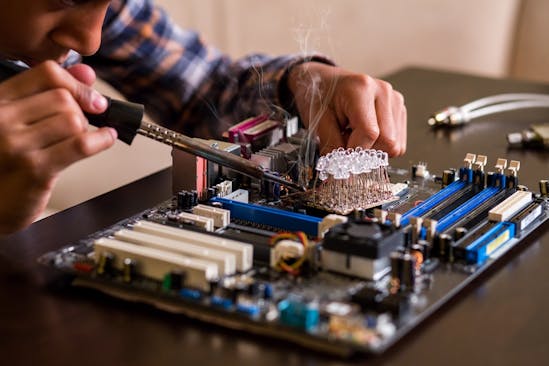Ethics of Electrical Engineering
Denise Nyguen's describes ethics as the following,
"Ethics is the set of rules and guidelines that engineers adhere to as a moral obligation to their profession and to the world. Engineering is a professional career that impact lives. When ethics is not followed, disaster often occurs; these disasters not only include huge monetary costs and environmental impacts, but also often result in the loss of human life. Engineering Ethics applies to every engineer and is very important."
As a future Electrical Engineer who may one day be a project manager, many consist of many opportunities but also, come with many responsibilities.
Electrical engineers study and apply the physics and math, electronics, and electromagnetism to both large and small scale systems to process information and transmit energy. Electrical engineers design computers, electronic devices, communication systems, test equipment, electric power networks, and improve systems through problem solving techniques. Electrical engineers may work on a diverse range of technologies, from the design of household appliances, lighting and wiring of buildings, telecommunication systems, electrical power stations and satellite communications. They may plan their designs using computer-aided software or they may also sketch ideas by hand.
As for many Engineering fields they're sub-disciplines for Electrical Engineering:
- Electronic Engineer
- deals with electronic circuits such as resistors, capacitors, inductors, transistors and diodes
- Microelectronic Engineer
- deals with design and micro-fabrication of tiny electronic circuit components
- Signal Processing Engineer
- deals with signals, such as analog or digital signals
- Power Engineer
- deals with electricity and design of related electrical devices such as transformers, generators, motors and power electronics
- Instrumentation Engineer
- deals with the design of measuring devices for pressure, flow and temperature
- Computer Engineer
- deals with the design of computers and computer hardware
With each discipline comes along with their own but amongst Electrical Engineers adhere to the following:
- to accept responsibility when making decisions consistent in regards to safety, health, welfare of the public, and to disclose promptly factors that might endanger the public or the environment;
- to be honest and realistic is stating claims or estimates based on the available data;
- to reject any bribery;
- to improve the understanding of technology, its application, and consequences;
- to treat all individuals fairly, not to engage in any acts of discrimination based on race, religion, gender, disability, age, national origin, sexual orientation, gender identity, or gender expression;
- to seek, accept, and offer honest criticism;
- to assist colleagues and co-workers in professional development;
The listed ethical guidelines should be taken into consideration for every Electrical Engineer.
The Therac-25 was a radiation therapy machine that was produced by the Atomic Energy of Canada Limited (AECL) in 1982. There had accidents that occurred from 1985 to 1987, in which patients were given massive overdoses of radiation. Due to a mixture of software and hardware issues it gave patients radiation doses that were hundreds of times greater than normal, that resulted in serious injuries or cause death from radiation poisoning. The root causes were primary software issues, but also AECL did not test the combination of software until it was assembled at the hospital. The engineers were overconfident with there design and
EE Malfunctions
As engineers, we designed and manufacture products so that in terms we cab better our lives. Although that isn't always the case for example there was the Therac-25 accident.The Therac-25 was a radiation therapy machine that was produced by the Atomic Energy of Canada Limited (AECL) in 1982. There had accidents that occurred from 1985 to 1987, in which patients were given massive overdoses of radiation. Due to a mixture of software and hardware issues it gave patients radiation doses that were hundreds of times greater than normal, that resulted in serious injuries or cause death from radiation poisoning. The root causes were primary software issues, but also AECL did not test the combination of software until it was assembled at the hospital. The engineers were overconfident with there design and
 |
| *not the actual machine, but a modern version of one. |
Taking upon the title of an Electric Engineer or any Engineer for that matter requires diligent work ethic. You are a problem solver trying to solve real world problems, which means they're real people's lives at stake. This means that there isn't any room for cutting corners, cutting corners leads to terrible results and products. That is why all engineers should follow the ethical guidelines to ensure nothing problematic occurs.
References:
Nguyen, Denise. “Engineering Ethics.” Electrical and Computer Engineering Design Handbook, sites.tufts.edu/eeseniordesignhandbook/2013/engineering-ethics-2/.
“Therac-25.” Wikipedia, Wikimedia Foundation, 18 Sept. 2017, en.wikipedia.org/wiki/Therac-25#Root_causes.
“Therac-25.” Wikipedia, Wikimedia Foundation, 18 Sept. 2017, en.wikipedia.org/wiki/Therac-25#Root_causes.

No comments:
Post a Comment